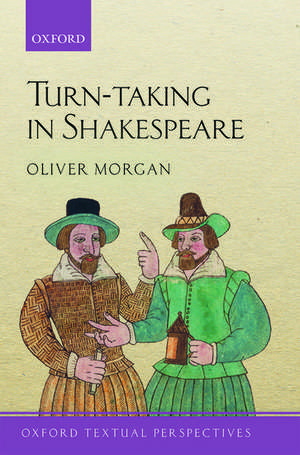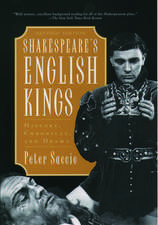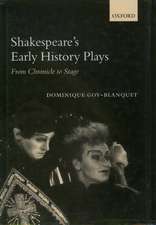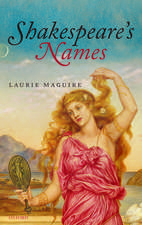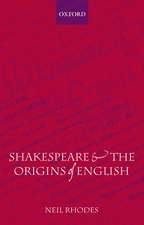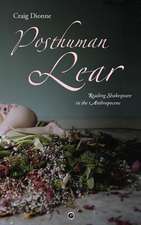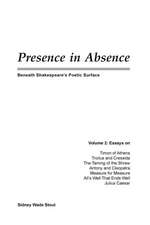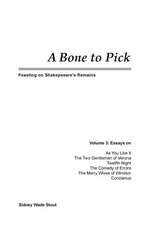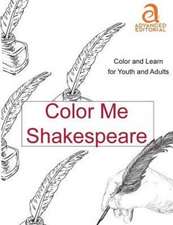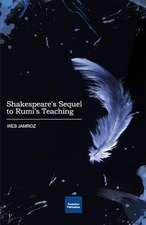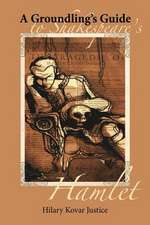Turn-taking in Shakespeare: Oxford Textual Perspectives
Autor Oliver Morganen Limba Engleză Paperback – 21 aug 2019
| Toate formatele și edițiile | Preț | Express |
|---|---|---|
| Paperback (1) | 173.06 lei 10-16 zile | |
| OUP OXFORD – 21 aug 2019 | 173.06 lei 10-16 zile | |
| Hardback (1) | 449.60 lei 31-37 zile | |
| OUP OXFORD – 21 aug 2019 | 449.60 lei 31-37 zile |
Din seria Oxford Textual Perspectives
- 14%
 Preț: 173.78 lei
Preț: 173.78 lei - 6%
 Preț: 164.82 lei
Preț: 164.82 lei - 6%
 Preț: 166.61 lei
Preț: 166.61 lei - 13%
 Preț: 151.40 lei
Preț: 151.40 lei - 8%
 Preț: 148.41 lei
Preț: 148.41 lei - 13%
 Preț: 151.77 lei
Preț: 151.77 lei - 8%
 Preț: 148.65 lei
Preț: 148.65 lei - 8%
 Preț: 148.91 lei
Preț: 148.91 lei - 13%
 Preț: 126.79 lei
Preț: 126.79 lei - 14%
 Preț: 124.47 lei
Preț: 124.47 lei - 13%
 Preț: 128.12 lei
Preț: 128.12 lei - 10%
 Preț: 245.44 lei
Preț: 245.44 lei - 9%
 Preț: 174.25 lei
Preț: 174.25 lei - 10%
 Preț: 241.35 lei
Preț: 241.35 lei -
 Preț: 215.27 lei
Preț: 215.27 lei - 8%
 Preț: 179.64 lei
Preț: 179.64 lei - 14%
 Preț: 177.64 lei
Preț: 177.64 lei - 6%
 Preț: 174.32 lei
Preț: 174.32 lei - 6%
 Preț: 165.03 lei
Preț: 165.03 lei
Preț: 173.06 lei
Preț vechi: 184.82 lei
-6% Nou
Puncte Express: 260
Preț estimativ în valută:
33.12€ • 34.45$ • 27.34£
33.12€ • 34.45$ • 27.34£
Carte disponibilă
Livrare economică 13-19 martie
Preluare comenzi: 021 569.72.76
Specificații
ISBN-13: 9780198836360
ISBN-10: 0198836368
Pagini: 300
Ilustrații: 5 Illustrations
Dimensiuni: 134 x 202 x 15 mm
Greutate: 0.38 kg
Editura: OUP OXFORD
Colecția OUP Oxford
Seria Oxford Textual Perspectives
Locul publicării:Oxford, United Kingdom
ISBN-10: 0198836368
Pagini: 300
Ilustrații: 5 Illustrations
Dimensiuni: 134 x 202 x 15 mm
Greutate: 0.38 kg
Editura: OUP OXFORD
Colecția OUP Oxford
Seria Oxford Textual Perspectives
Locul publicării:Oxford, United Kingdom
Recenzii
This book was a joy to read because of the many colourful twists and turns of its critical language, because the author is a meticulous and imaginative close reader, and because the argument offers a very good model for stylistic micro-analysis as a mode in Shakespeare criticism. I hope that theatre practitioners, students in drama studio programs, and critics alike will find this book of use.
A galvanising new way of interpreting Renaissance plays. The mechanisms of dialogue - the sequencing of speakers, their interruptions, pauses, and failures to respond - open out new insights into character, dramaturgy, social relationships, and ideological structures. While the focus is on Shakespeare, and what Morgan stylishly argues is his brilliance in dialogue, the implications stretch to Renaissance drama more broadly.
Shakespeare has seldom been read with a combination of such tact and quantificatory precision ... Morgan's learning and ingenuity are considerable, and he shows beyond any shadow of a doubt that attentiveness to the conventions of conversational exchange (and to the occasions when these conventions are ignored) offers a fresh way of comprehending the plays.
A galvanising new way of interpreting Renaissance plays. The mechanisms of dialogue - the sequencing of speakers, their interruptions, pauses, and failures to respond - open out new insights into character, dramaturgy, social relationships, and ideological structures. While the focus is on Shakespeare, and what Morgan stylishly argues is his brilliance in dialogue, the implications stretch to Renaissance drama more broadly.
Shakespeare has seldom been read with a combination of such tact and quantificatory precision ... Morgan's learning and ingenuity are considerable, and he shows beyond any shadow of a doubt that attentiveness to the conventions of conversational exchange (and to the occasions when these conventions are ignored) offers a fresh way of comprehending the plays.
Notă biografică
Oliver Morgan is a Leverhulme Early Career Fellow at the University of Cambridge and a College Lecturer at Magdalene College. His research focuses on dialogue, both in the sense of fictionalised conversation (as in a play) and in the sense of literary exchange (as in an answer-poem or aparody).
